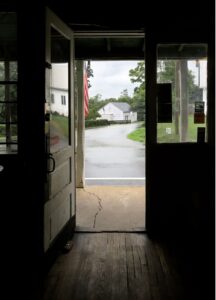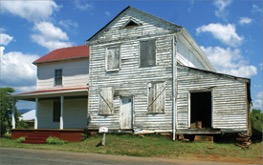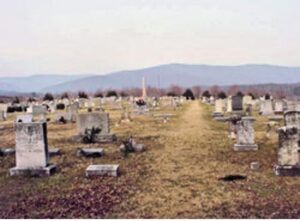Daisy’s Kin

I was fourteen years old, and we’d just moved into the parsonage in White Hall, Virginia. I was walking down the road to Wyant’s Store when a girl about my age came speeding up behind me on a fire-engine-red bicycle and almost ran me down. I jumped into the ditch as she raced by, laughing.
When I got to the store, she stood in the back by the drink machine sipping an orange Nehi. She tucked a strand of brown hair inside a head-scarf tied tightly to her chin and flashed an impish grin at me. That grin led me to believe she’d brushed by me on her bike as a tease. I hadn’t made any friends in White Hall, so I approached her. “Hi,” I said.
She burst out laughing, sprinted up the aisle, and bolted out the door.

“What the heck?” I muttered.
Old Mr. Wyant, standing up front by the cash register, shook his head and smiled. “Don’t mind Daisy, son. She’s peculiar. Runs in her family.”
Mr. Wyant was being kind. “Tetched in the head” was the phrase most people used to describe Daisy and her kin.
She wasn’t a teenager like I thought. She was 24 when she chased me off the road with her red Schwinn Phantom. She was still riding that bike at age 34 ten years later when I left White Hall. In all that time, I never saw her without a scarf covering her head. One of the girls from the church told me Daisy always wore scarves because she didn’t wash her hair. And although I saw Daisy laugh and giggle many times over the ten years I knew her, she never spoke a word in my presence. I don’t know if she couldn’t talk or just had nothing to say.
 She lived in a trailer in the woods with her mother, Lottie. Lottie was in her mid-fifties, short and stumpy with a weathered face, hearty laugh, and wide smile sporting a gap where her upper front teeth should have been.
She lived in a trailer in the woods with her mother, Lottie. Lottie was in her mid-fifties, short and stumpy with a weathered face, hearty laugh, and wide smile sporting a gap where her upper front teeth should have been.
Something about her made me uneasy. I told one of my friends she gave me bad vibes. “You can’t let your guard down around her,” he said. “She’s the kind would sneak up on you in your sleep and cut your throat.” He based that comment on a rumor that Lottie sold Daisy’s favors to a man, and when he wouldn’t pay, she cut up his face with a penknife. I doubt this was true. There were lots of stories about Lottie and Daisy, but they were usually short on names and details.

Daisy’s father, Ray, and Lottie split up before I moved to White Hall. He lived by himself in a little shack near Moorman’s River. He was in his sixties, tall with a melon-sized bald head, round blubbery face, flabby chest, and bulbous belly that jiggled when he walked. They say he was a good farmhand in his day, but he no longer worked by the time I came along.
People made fun of him for his curious affliction. About every ten seconds, he would emit a “Teep!” It was continuous, like a permanent case of the hiccups. I don’t know how he got any sleep.
My buddy and I were squirrel hunting one afternoon when we heard a strange sound coming from the other side of the hill. We hid in the brush and watched as Ray passed by us, stalking small game with a shotgun, trying his best to be stealthy, but even with his lips closed tight, the Teep came through. “Bup … Bup … Bup.”

Daisy’s oldest brother, Martin, was a rail-thin scarecrow with dark sunken eyes. Most days he pedaled a rickety bike to the old Piedmont Store and stood in a corner, staring vacantly into space. When spoken to, he replied, “I’m f‑f-fine. H‑h-how y‑y-you?” That was about as far as he could carry a conversation.
He suffered from an affliction similar to Ray’s, but his was episodic and it came on like a seizure. We were working in the fields on a hot afternoon loading hay bales on a flatbed wagon when one of his spells hit him. He began to roll his shoulders and duck his head. Then a raw, hoarse cry, like the honk of a goose, came up out of him from deep down in his chest. It repeated about every ten seconds. Again and again. Martin’s spell lasted about fifteen minutes, then died off as inexplicably as it started, and we all went back to work.
I saw him struggle through several episodes over the years. They followed the same course. When they were over, we all went about our business and acted as though nothing had happened.

One of Daisy’s older brothers, Ned, worked full-time as a farmhand. He lived alone in a room over a shed on the farm. In 1964, I worked beside him all summer. He couldn’t read or write and got most of his information from the radio. He was amazed that I knew so little about world affairs. He patiently explained to me that Hitler was alive in Argentina planning a Nazi come-back, that the end of days would come in 1968 at dawn on Easter morning, and that the Russian launch of a cosmonaut into orbit was fake. “Don’t seem like you know much with all your book learnin’,” he said, curling his lip. Despite my ignorance, we got along well, and I learned a lot from him. He was a knowledgeable, reliable farmhand; he worked hard every day; and he paid his own way all his life.

Daisy’s youngest brother lived in the trailer with her and Lottie. He usually went outside only at night when no one was around, but I caught a glimpse of him in a rare daytime sighting. My pal and I were rabbit hunting on an old fire road in the woods when Daisy and a tall lean man with coal-black hair came around a bend. At the sight of us, the man cried out and ran away, and Daisy followed him.
“That’s Jack,” my pal said. “He’s afraid of people.”
A couple years later, Lottie and Daisy showed up at the parsonage, sobbing. “Please help us, preacher,” Lottie said. “We don’t have no one else to turn to.”
Dad drove down the grassy road to the trailer. When he opened the door, blood spilled out on the steps. Inside, the shotgun was still propped between Jack’s knees. When the sheriff and medical examiner were done, Dad cleaned the floor and walls as best he could, and Lottie and Daisy went back to live in the little tin box where Jack had killed himself. They had no place else to go.
These old memories lay dormant in the shadows of my mind until last week. Researching a White Hall family on Ancestry.com, I stumbled across Daisy’s obituary. Since then, I’ve been thinking about her and the others in ways I was too immature to consider when I was a boy.
I wonder now how they got along. Federal welfare programs were just getting off the ground back then; Virginia’s Department of Social Services was in its infancy; and non-emergency healthcare didn’t extend to people who couldn’t pay. Jack’s psychological disorder, Ray’s affliction, Martin’s seizures, and Daisy’s arrested development all went undiagnosed and untreated. I don’t recall anyone even suggesting they should receive medical attention.
The White Hall community provided a safety net of last resort. When they got in big trouble, someone always helped them out, but day to day they had to make do on their own with all their disadvantages, and yet all of them, except Jack, lived into old age. Lottie and Ray died of natural causes in 1980, Martin in the 90’s, then Ned, and Daisy last in 2006.
It seems to me now that perseverance in the face of immense obstacles and myriad disappointments should have earned Daisy and her kin some respect, but most people back then, including me, didn’t give it to them. Daisy’s obituary implies she went to her grave without gaining it.

“Daisy Lee Hatch, 69, died November 6 at Martha Jefferson Hospital. Born March 8, 1937, in Free Union, she was the daughter of Raymond and Charlotte Hatch. She will have a private service.”
Three sentences. Thirty words. Terse, dismissive. Nothing about a life spanning seven decades. No mention of surviving relatives or mourners. My guess is private service meant no service.
Daisy and her family lived hard lives. I wish I and others had treated them better when it would have done them some good, but those days are gone and can’t be changed. All I can do now is remember them, tell a small part of their story to keep their memory alive, and hope their ghosts will pardon the thoughtlessness of the boy who lived in the parsonage sixty years ago.



April 29, 2023 @ 3:14 pm
Very moving. Thank you.
April 30, 2023 @ 8:07 am
Thanks, Mike.
April 29, 2023 @ 1:48 pm
Very moving, Ken. But also, very disturbing. I believe there are still areas in the country where people with similar disabilities and medical conditions are unable to access the care they need. For example, over 19% of the people in Mississippi live in poverty. In Louisiana it is 18.5 %. I could do on and on, about how the richest nation in the world fails its most vulnerable population.
April 29, 2023 @ 3:57 pm
I agree with that. In 2022 16.4% of Californians lived below the federal income poverty level, and I’ve seen studies adjusting for the higher cost of living here that say it’s more like 30%. Homelessness abounds. Local charities are overwhelmed. Today, Virginia is doing a better job with people like Daisy’s kin. It had the tenth lowest poverty rate among states in 2021. But it was still 10%, which is a lot of people. My story doesn’t say how we should fix this because I don’t know how, but my memories of these people, now that I’ve got the perspective of age, forced me to think about their problems, and if there’s a solution, it probably starts with empathy, unfortunately a scarce commodity these days.
April 29, 2023 @ 11:52 am
Hi Ken-
I have spent the past few hours contemplating the word “thoughtlessness” that you used in your last paragraph. I know that most that know you would only think of your thoughtFULness.
I’m reminded of Twain’s quip about being a boy of 14:
“When I was a boy of 14, my father was so ignorant I could hardly stand to have the old man around. But when I got to be 21, I was astonished at how much the old man had learned in seven years.”
As with many things Twain, I’m not sure whether he said that or not — that’s not my point. My point is that we are born unaware and we grow into our awareness of others and our surroundings. Some never do. You certainly have, more so than many. I have no doubt that if you as an adult had come across Daisy and her family, you would have bent over backwards to understand and help them.
Geez, I sound like a therapist.
Once again, you have given me a great gift with your post. But this time I’m not crying or laughing. I’m wondering. Who are the Daisy’s in my life today, and am I doing all I can to be there for them?
Thanks for your thoughtFULness.
April 29, 2023 @ 3:26 pm
Thanks, Lucian. My mother used to attribute that Twain quote to Pat Boone. I don’t know where it came from, but it sounds like Twain in that it makes a good point with humor. I tried to make a similar point in Old Wounds to the Heart. Eighty-year-old Billy Kirby complains that he was too stupid to do things right when he was young and when he got older and figured out the smart moves it was too late to fix up his mistakes. So, they rode in the bottom of his heart like sack of cold stones. Billy carried a ton of regrets into old age. I don’t have that many, but I’d welcome a chance to do some old stuff differently. This is one of them.
April 29, 2023 @ 11:10 am
I passed this along to my sister who responded “Be kind to past versions of yourself that didn’t know the things you know now.”
I can be hard on myself sometimes.
April 29, 2023 @ 3:17 pm
Good advice. Your sister is wise. Luckily, I don’t have many regrets. This is one of them, but it’s not keeping me awake at night. I wasn’t mature enough at the time to act differently, but sometimes I wish we got second chances.
April 29, 2023 @ 2:08 am
Sad and very touching
Thank you for sharing that
April 29, 2023 @ 7:43 am
Thanks, Janet.
April 28, 2023 @ 7:59 pm
Thanks Ken. That’s a story that likely brings up in us all the times we haven’t shown respect because of circumstances we may not understand. I know that I’m guilty and would like to have some of my younger years and acquaintances back to relive. Thanks again. I love your perspectives on life and look forward to more. Dan
April 29, 2023 @ 7:43 am
Thanks, Dan. In some instances, when we’re young we don’t know enough to do the right thing, and when we’re older and have learned what we should have done, it’s too late to correct our mistakes. We don’t get second chances very often. I’ve begun to realize lately that happiness in old age is not finding many of those instances in our past and misery is struggling with a whole bunch of them. Thankfully, I don’t have many regrets. This story features one of them.
April 28, 2023 @ 12:07 pm
Very sad story! They probably all suffered from some type of problem…autism or Tourette syndrome. Thank you for sharing your childhood memories.
April 28, 2023 @ 12:44 pm
Thanks, Barbara. Their lives present a sad story, but it’s also inspiring to me in a strange way.
April 28, 2023 @ 10:55 am
Another moving story Ken and no one can tell them like you do. This was a lesson most adults never learn. Thank you for sharing.
April 28, 2023 @ 12:43 pm
Thanks, Stu!
April 28, 2023 @ 10:42 am
Ken, I loved this story. It brought back so many memories from my youth there. I especially loved the picture of Wyatt’s store.
Beyyie Head Hall
April 28, 2023 @ 12:42 pm
These old memories took me back there, too, Bettie. White Hall was a special place. Still is, I hope.
April 28, 2023 @ 10:20 am
Great story and memories Ken. Things were quite different back then. As kids in that era we didn’t understand a lot of what was happening, and that was probably a good thing. In retrospect it’s amazing that folks who lived in those poor conditions actually lived as long as they did.
April 28, 2023 @ 12:40 pm
Thanks, Randy. You’re probably right that it was probably a good thing we didn’t understand the full measure of what was going on around us back then. I hadn’t heard anything about these people after I left White Hall, so when I found their genealogical files, I was surprised they’d lived so long. The challenges they faced were daunting, to say the least.
April 28, 2023 @ 10:12 am
Ken, along with tour amazing way with words and unique storytelling, you have an immense catalogue of memories and experiences that belie your age. Keep telling us your stories.
April 28, 2023 @ 12:37 pm
Thank you, Gay. I’ve still got a few left in me, I think.